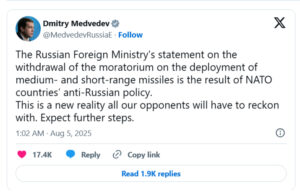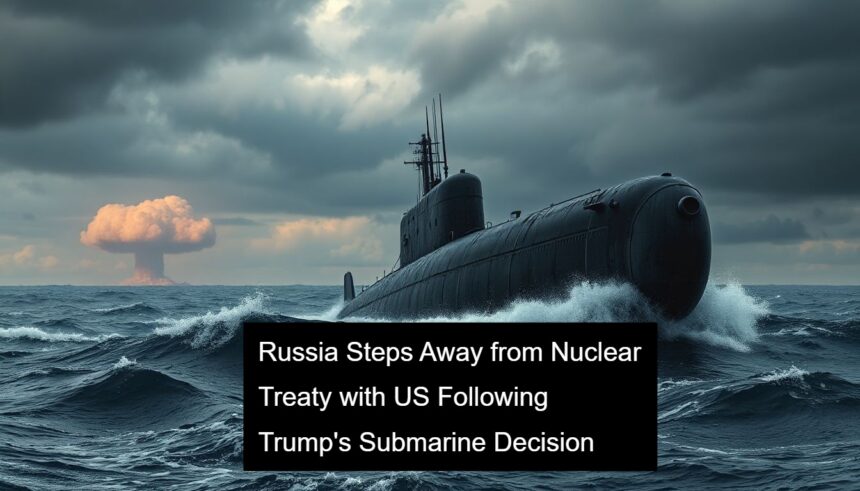The world’s nuclear security balance just shifted. Moscow made a big choice after a controversial move by the Trump team about US submarines. Russia now says it plans to pull back from a key nuclear treaty with the United States. This news sent shockwaves everywhere. It brings up big questions about arms control, global peace, and keeping nuclear weapons from spreading.
Russia has declared that it no longer considers itself bound by the 1987 Intermediate-Range Nuclear Forces (INF) Treaty with America, which placed a moratorium on the deployment of short- and medium-range nuclear missiles, in response to mounting pressure from US President Donald Trump to end the war in Ukraine. “The actions of Western countries” are to responsible for the “direct threat” to Moscow’s security.
Within days of US President Donald Trump’s directive for two nuclear submarines to “be positioned in the appropriate regions” close to Russia, the action was taken. The requirements for adhering to the pact from the Soviet period have “disappeared,” according to Russia’s Foreign Ministry, and Moscow is no longer following its earlier self-imposed limitations.
It stated in a statement that “West’s build-up of destabilising missile potentials create a direct threat to security of our country,” according to RT.
Later, former Russian President Dmitry Medvedev suggested Moscow might take more action in retaliation for NATO nations’ decision to lift a moratorium on short- and medium-range nuclear weapons.
“This is a new reality all our opponents will have to reckon with,” Medvedev, who has been exchanging sharp jabs with US President Donald Trump on social media, stated. Anticipate more actions.
Medvedev, who is currently the deputy leader of Russia’s influential Security Council, did not provide any details.
https://x.com/MedvedevRussiaE/status/1952452686802198557

Russian non-compliance was the reason for the US’s 2019 withdrawal from the Intermediate-Range Nuclear Forces accord. Since then, Russia has stated that if Washington did not use such weapons, it would not. In the strategic realm, however, Moscow would have to react to what he described as “destabilising actions” by the United States and NATO, as Foreign Minister Sergei Lavrov hinted last December.
“Since the situation is developing towards the actual deployment of US-made land-based medium- and short-range missiles in Europe and the Asia-Pacific region, the Russian Foreign Ministry notes that the conditions for maintaining a unilateral moratorium on the deployment of similar weapons have disappeared,” the ministry said in its statement.
About INF Treaty
A whole class of weapons—ground-launched missiles with a range of 500 to 5,500 kilometres (311 to 3,418 miles)—were abolished by the 1987 INF pact, which was signed by Soviet leader Mikhail Gorbachev and American President Ronald Reagan.
Initially viewed as a moderate and reformer in the West, Medvedev has turned become one of Moscow’s most hardline top foreign policy leaders.
In reaction to Medvedev’s comments regarding the possibility of conflict between the nuclear-armed foes, Trump said last Friday that he had ordered the relocation of two nuclear submarines to “the appropriate regions.”

